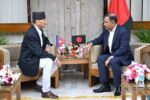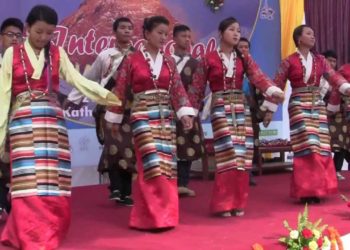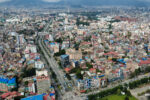KATHMANDU: Recent unofficial data reveals a staggering exodus, with over 1,500 individuals departing Nepal every day.
The Tribhuvan International Airport (TIA) remains abuzz with foreign-bound air traffic, reflecting the escalating competition for overseas opportunities in employment and education.
The specter of seeking a brighter future abroad now looms large in the minds of the generation that has devoured knowledge two-fold or more.
This growing cohort believes that staying within the country equates to sealing the fate of their aspirations.
In a recent research by Khabarhub, representative individuals of the Plus Two generation were asked, “What steps should be taken to make the country conducive for your future?”
Many among them actively engage in political discourse, attributing their desire to leave to the commercialization of education, healthcare challenges, and a dearth of employment opportunities.
They argue, “The lifestyle of the previous generation doesn’t align with our values. The education system prioritizes theory over practical skills. The political landscape, from bottom to top, fails to comprehend our needs and aspirations.”
“How can we sustain ourselves in a country where employment opportunities don’t match our qualifications?” they queried.
The social media narrative of children securing foreign visas and sending money back home may convey joy, but the true reality and hardships faced by these young individuals who ventured abroad on loans tell a different story.
Despite acknowledging the financial burden on their families and the significant outflow of remittances, the Plus Two Generation struggles to discern a glimmer of hope within their homeland.
Salina Adhikari, a class 12 student at Himalaya College, reflects on her future plans, stating, “Staying and working in the country is insufficient to sustain myself. I am currently preparing to go to Australia, aiming to clear ILTS and PTE exams once my 12th-grade results are out.”
She expresses, “Initially, when I enrolled in class 11, I was optimistic about studying business and contributing to Nepal. However, rather than staying in Nepal for a four-year bachelor’s degree, I’ve decided to earn money and pursue my studies more effectively.”
Asbina Gurung, a postgraduate student at Tribhuvan University Faculty of Humanities, emphasizes her commitment to her homeland as a top priority.
Despite this dedication, she laments the lack of promising prospects.
She remarks, “Even if something is available in Nepal, I think, ‘Let’s do it.’ But after completing my Masters, I secured a job, bought rice, yet it’s insufficient for vegetables.
Purchasing vegetables is still not enough to cover rice expenses. Managing both becomes problematic, especially when it comes to paying rent. How can one build a career in such circumstances?”
Saleen Adhikari, an alumna of Bishwa Niketan, reflects on the discouraging state of the country’s politics and economy, stating, “The current decline forces us, the youth, to go abroad instead of staying and contributing here. Who would willingly leave their home if given the opportunity?”
The youth feel compelled to go abroad due to limited options. Addressing the responsibility of caring for elderly parents and siblings, one individual preparing for the Korean language proficiency exam notes, “When the capable workforce leaves the country, there’s a lack of manpower for productive sectors. We end up importing everything, even food, leading to a skyrocketing cost of living.”
The uncertainty about their future has left the youth confused. The rising number of foreign nationals is indicative of the dearth of employment opportunities in the country, pushing recent graduates to view their future abroad.
The increasing cost of living, insatiable needs, and an unstable political system have led the youth to perceive living in the country as a form of punishment.
While Nepal is traditionally viewed as an agricultural country with the potential to yield gold through hard work, obstacles hinder the aspirations of those who wish to contribute within the nation.
Young individuals interested in agriculture encounter challenges such as delayed access to fertilizer and seeds, along with middlemen complications in selling produce.
Nowadays, even parents in Nepal often anticipate their children going abroad.
The social media narrative of children securing foreign visas and sending money back home may convey joy, but the true reality and hardships faced by these young individuals who ventured abroad on loans tell a different story.









Comment